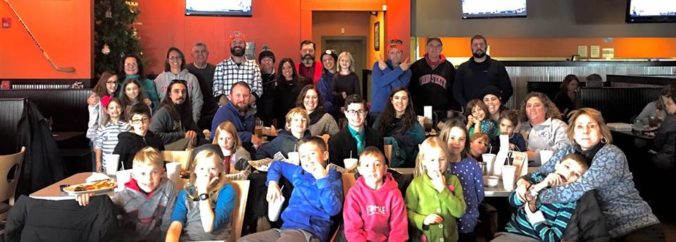Several years ago, my dad and his brothers went to a boxing match. It was a kinda-big-deal match and they ended up with seats close to the action (I’m guessing a casino was involved). Not being huge followers of the sport, they were immersed in the excitement, with fans shouting all around them their encouragement on what the fighters should do next. Words like “jab” and “hook” and fancy boxing terms, probably. To join the excitement, and coincidentally at a lull in the noise, my father – proud daughter moment ahead – shouted, “hit ’em in the nose!”
The guy in the ring straight up looked at him.
Since that time, this tale has been told and retold within the extended family and it never gets less funny. Hit ’em in the nose is our solution to dance offs, card games, and toddlers bickering.
Yesterday, a quorum of Wingfields descended upon the Chiller North hockey ring to support the eldest two of the second generation cousins. It was like a circus car watching families arrive and join the group – we just kept coming. Being B’s senior year and last season, we self-determined to make as much ruckus (a family talent) possible.
While our skills at yelling and making a scene are well-practiced, our knowledge of hockey is rather limited. We took our cues from the parents of the kids on the rink, knowing when to be upset about a call or not. Meaning, when cousin Wendy informed the ref of a missed call for icing (which, btw, has nothing to do with cookies or cake, I’m sad to inform you), I simply yelled, “Yeah! What she said!” You know, because I’m there to show support. The 40 or so of us chanted his number and stomped our feet on the noisy bleachers.
Cousin B had a breakaway moment right in front of our whole family, so we were loudly supportive . Get it! Go! Come on, B!
You know where this is going.
From the middle of our group… HIT ‘EM IN THE NOSE! Followed by uproarious laughter.
I’d like to make a list of things you should apparently not encourage at a highly-physical sporting event of young men and protective mamas:
1. Acts which require you to drop the gloves.
We learned our lesson after there was an incident of shouting, standing, leaning, talk-to-the-hand motioning, and more words. A mom from the other team responded, “that’s my son out there!”
Whoops.
Now, let me assure you, we are not nasty fans. We are hilarious. We were obvious about our love for our cousin and our ignorance of all hockey rules. We really couldn’t name where the other team was from nor did we really pay attention to the fact that another team was even on the rink. It was the B Show, with some other actors. So we were a tad sorry-not-sorry because, really, can you take anyone seriously when they open with cheers and an Arsenio Hall style “woot woot woot”? The only thing we were bitter about was the numbness of our toes.
One of my kids asked, legitimately confused, why the other mom was so upset. My best explanation was that some people believe that cheering for someone means we’re trying to be mean to everyone else. They mistakenly took personally that our love for one kid meant less love for hers. She believed that love and support were in limited supply and when she operated in that mentality, it was clear that her kid was getting ripped off and our B was getting “too much.”
While I love some aspects of athletics, this, my friends is a dangerous side effect. Healthy competition for personal betterment aside, there’s a real tendency to begin to believe the world only works in Us/Them, Home/Visitors dualities.
Support your kid. Cheer for wins, console for losses. Help them get better, remind them of their worth beyond the game. These are good things.
And can I offer a recommendation? For every hour you spend in the bleachers supporting your team, spend at least 2 hours at a table, reminding yourself that we belong to one another. Put yourself next to others, sharing food and passing drinks and remembering there doesn’t always have to be a “them” for you to experience good things.
Perhaps then you’ll be able to arrive at the field/gym/rink in a place of worthiness, able to appreciate that one of the kids out on the rink is having a memorable day, he’s being loved and supported by family from near and far, and you can just be glad for him. Or, you can be inspired and call up your siblings and cousins and uncles and say, “hey, you know, my kid has a game next Sunday, and though it’s sub-arctic temperatures in the rink, the games are free and fun and he would love it if you came and cheered him on.” And you would get to have day that all your family left saying, “that was so much fun, I love my family, and we should do that more often.”
